A day in the life of Riko, Trinidad and Tobago's only tactical/explosive-detection dog
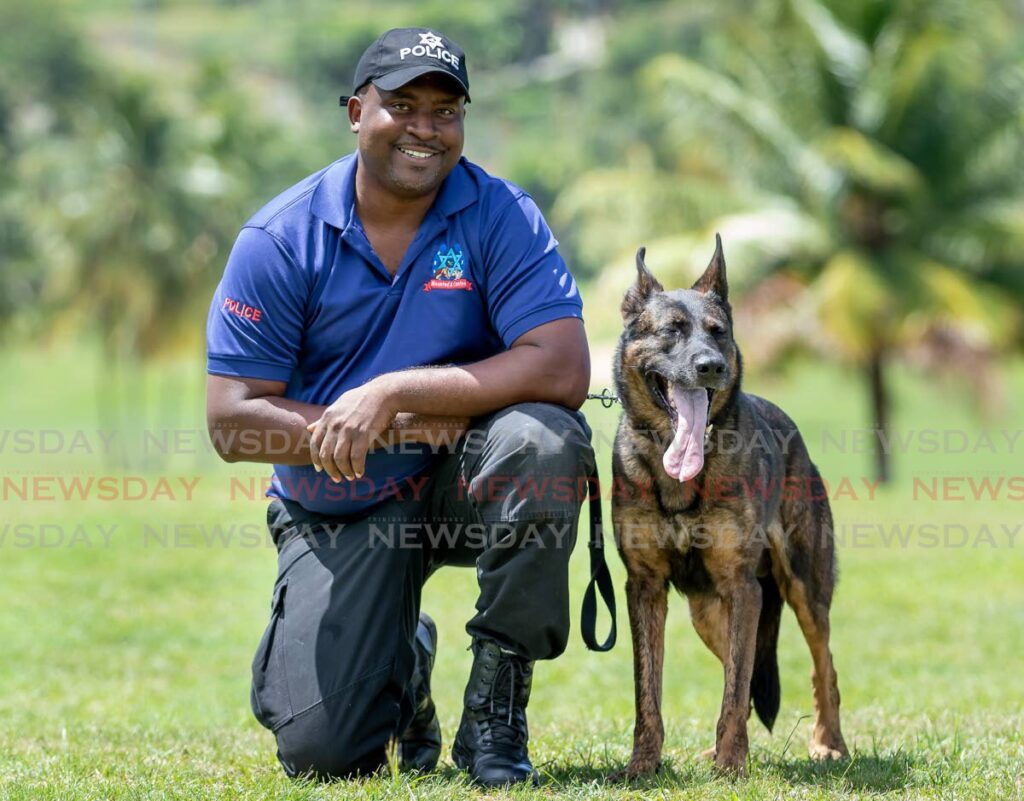
Sgt Darren Baptiste expected a typical day’s work at the Crown Point police station when he got a call from Sgt Arnell Jones, Tobago’s resident bomb technician, about a bomb threat at the Pentecostal Light and Life Secondary School in Scarborough.
It was 8 am on April 28.
The phone rang twice again: a canine officer in Trinidad and an officer at the Scarborough station also reported the threat.
“That’s the school my son goes to,” said Baptiste, the head of the Tobago canine section of the police service.
Baptiste grabbed a leash and his brindle Dutch Shepherd, Riko, and headed down the road with sirens blaring.
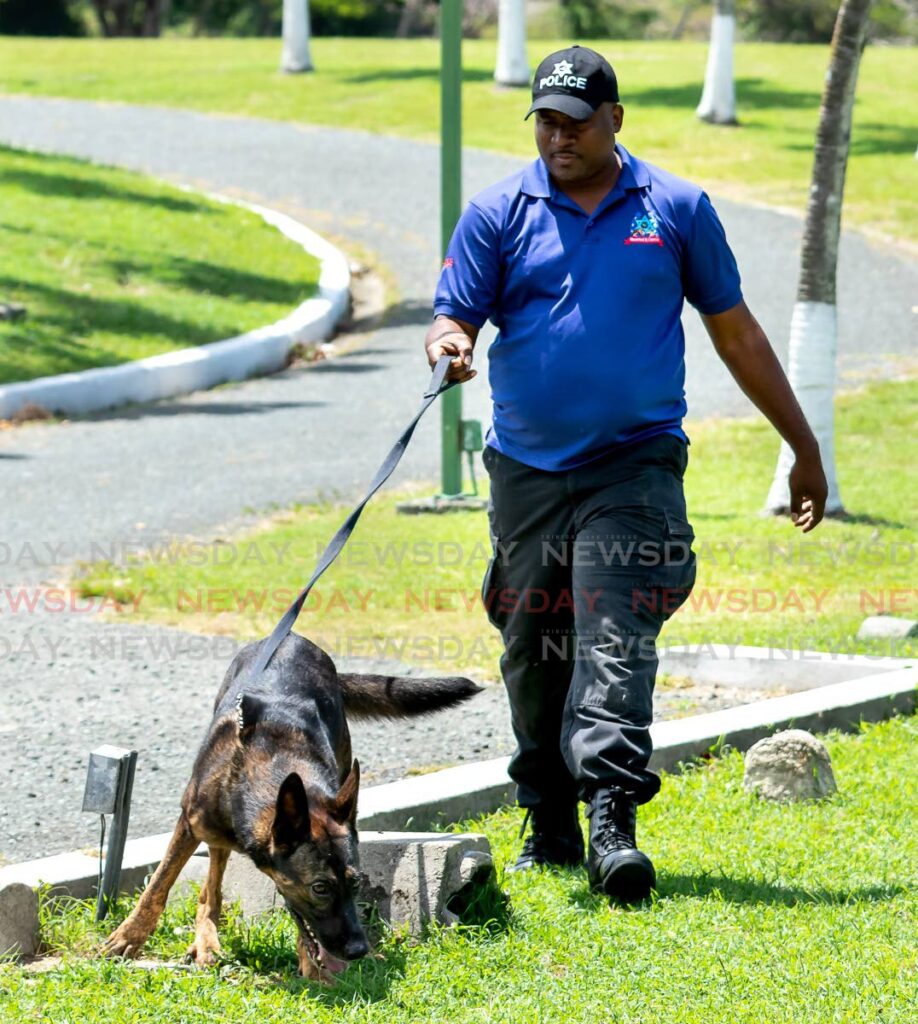
His initial thought, that “someone was playing the fool,” vanished after the 12-minute drive to the school when he saw Jones, other police officers and fire officers there. Riko leaped into action, searching outside and then in every classroom and office.
Usually, canine officers work in pairs, but Riko worked alone because he is the only explosive detection dog currently stationed in Tobago.
Baptiste led his canine partner to each office and classroom, let the dog off leash, and stayed about 20 feet away while the dog searched.
Riko showed no interest in anything. His ears did not go up as they do when he locates an explosive device in training. He did not "freeze" as he is trained to do when he finds a suspicious item.
About halfway through the search, Jones told Baptiste the police had also received a threat about Signal Hill Comprehensive School.
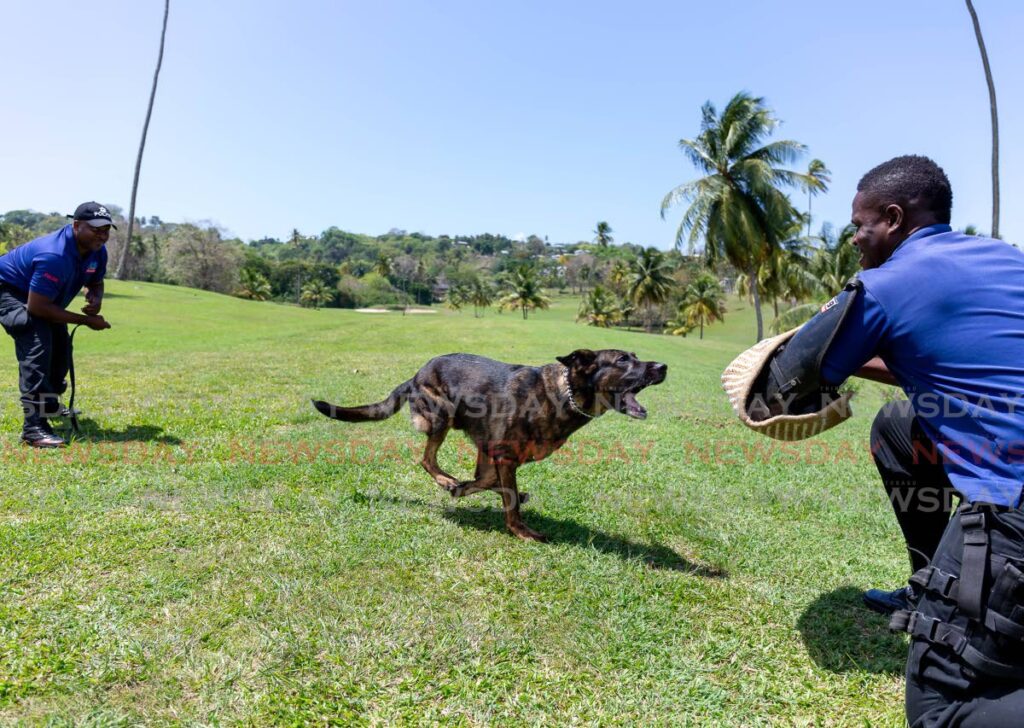
They finished searching, but before the explosive detection team could reach the second school, they were told of threats to the Harmon School of Seventh-Day Adventists and Scarborough Secondary School.
“I asked myself, ‘What is going on?’” Baptiste told Sunday Newsday.
He had not yet seen the e-mail that threatened nine schools in Tobago and nearly 200 schools around the country.
“I knew I had to finish one school before going to another. I knew every school had been evacuated, so I thought, ‘Let’s hope there is no explosive device.'”
As Rico cleared an area, the bomb technician did his physical check. Every time Riko finished searching a room, he ran back to Baptiste.
“Riko is full of energy – very hyper – but he really surprises me on searches,” said Baptiste. “He will go and go. Once he gets water and a five-minute rest, he’s ready to go again. He never tires of the task – even when he doesn’t find anything.”
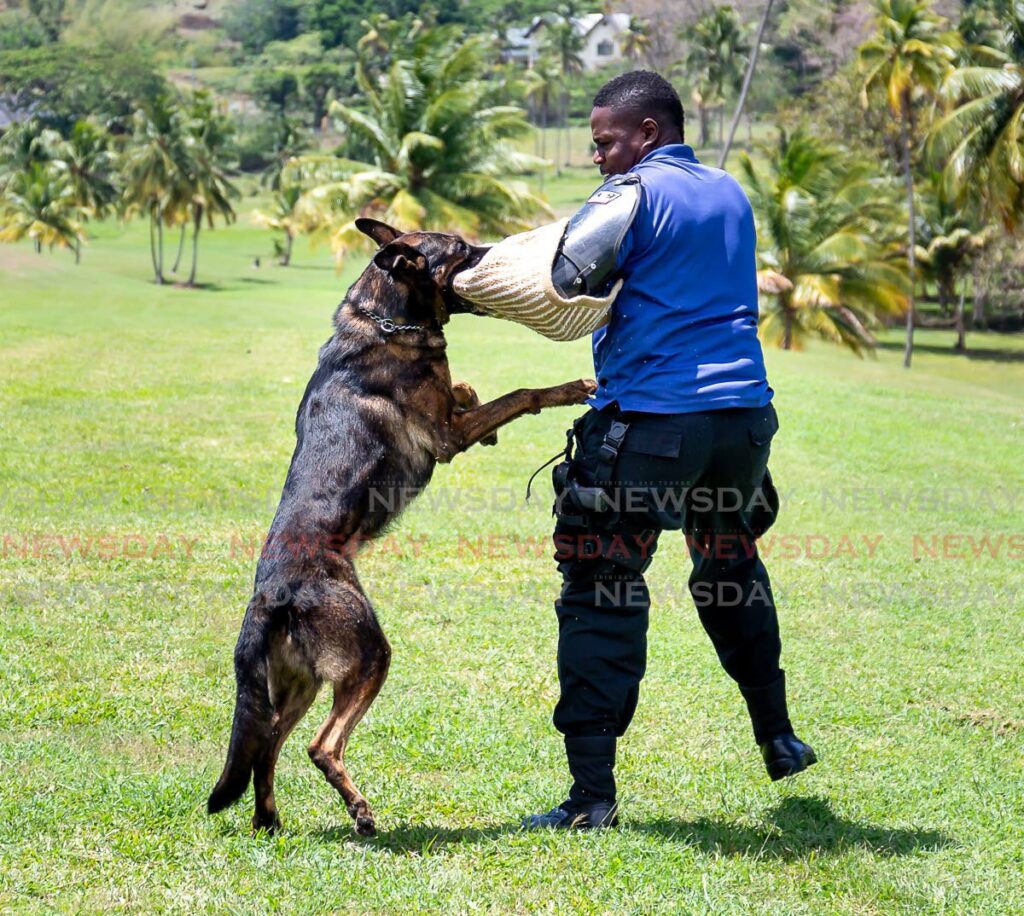
Baptiste continued to think about how tiring this day would be for Riko, but his confidence in his dog soared.
“I don’t worry about Riko at all. He’s on-spot with his detection. I know once there is something there, he will find it.”
On they went to Scarborough Secondary School, Goodwood Secondary School, Bishop's, Mason Hall Secondary, Roxborough Secondary and Speyside Secondary, in the second-to-last village in Tobago from Crown Point.
Baptiste knew no help from Trinidad was coming. The TTPS canine explosive detection section, under Cpl Carl Carribon, currently has only four officers and four dogs in Trinidad. They too had their hands full.
"It was a very tiring day. It took everything out of me. But Riko rose to the occasion. I never worked so hard in my whole police career. It was very stressful.
"I know Riko was tired, but that dog has real heart. He is just going.”
Baptiste rewarded his dog with his red "kong" toy to play with between searches.
“I wanted to keep him sprightly and interested in the search – not that I was seeing his interest ever diminish. Remember, the day was very hot. (It had crossed 35 degrees Celsius). I had to stop him from searching sometimes and make him rest.”
When they finally finished working at 9 pm, Baptiste said, “I thanked God we didn’t find anything, there was no loss of life and Riko was in good health.”
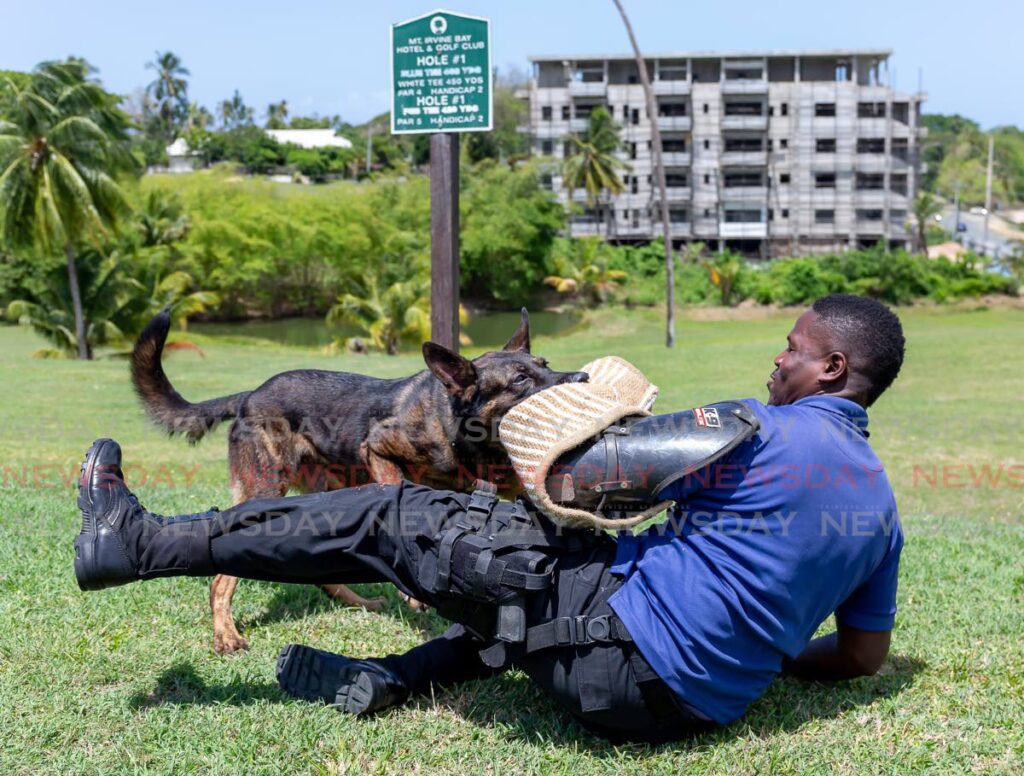
Baptiste heads the canine Tobago section with eight dogs and eight officers in total. Besides Riko, there are three tactical/narcotic/firearm dogs and four firearm/narcotic detection dogs. They are categorised as "passive," which means they are not trained to chase and catch suspects.
Born in Tobago, Baptiste worked in the Tobago division from 1998-2007. PC Sadiq Hamlett, who worked in the Tobago canine section, encouraged him to join canine. In 2007 he went to Trinidad to train with Anthony Piegaro, a civilian police dog trainer brought in by the US Embassy.
“I made it through Piegaro’s Hell Week,” said Baptiste.
He trained with explosive detection dog Buddy, but at that time, single-purpose explosive dogs like Buddy weren’t sent to Tobago.
Baptiste switched to Bruno, a big, tall, white labrador, and headed back to Tobago. When Bruno died of cancer, he returned to Trinidad and got Viper, the narcotic dog.
Everything changed when Tobago had its first bomb threat in February 2019 at the Tobago House of Assembly cultural office. Then came a bomb threat on the Spirit, a water taxi, on June 24, 2019.
“Senior officers here stated it was necessary for one of us in the canine section to give up our dog and take an explosive-detection dog. I volunteered. I gave up Viper, got Arco and returned to Tobago,” said Baptiste.
Subsequently, PC Enoch Romeo and Riko transferred together to Tobago, giving the island its second explosive detection dog.
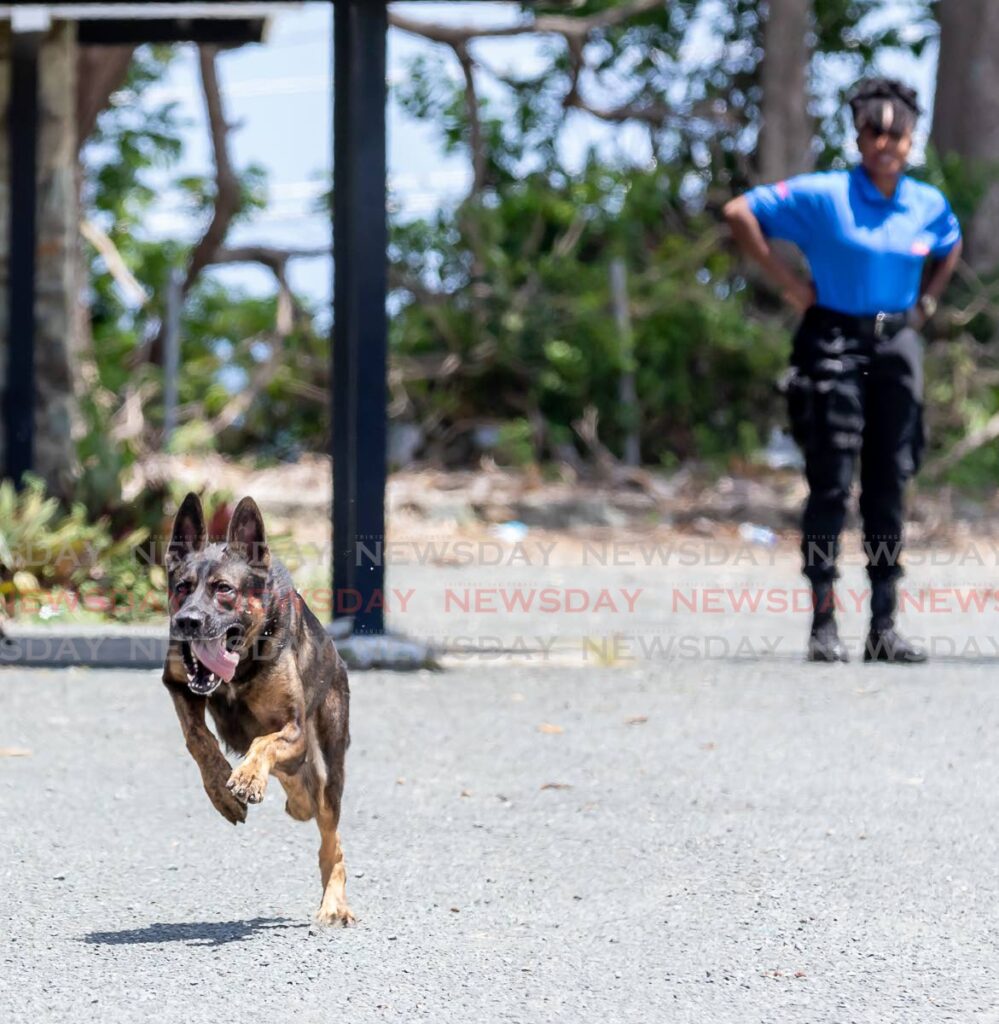
When Romeo was called back to Trinidad to work in the canine section’s dog training programme earlier this year, Riko stayed behind with Baptiste.
Arco was nine and due to retire. Baptiste knew Riko’s personality, because he and Romeo had worked Arco and Riko together. The transition was easy.
“Riko’s always inquisitive; always ready to work. As soon as he comes out of the kennel, he starts searching without any command. He works quickly.
"I wouldn’t say he was a dog children could play with. He’s not too much on touching up. If you touch him, he turns around and watches you, and he has an intimidating look.”
Tobago police dogs are busy. They check the port upon requests by the Tobago task force or port police. They are mandated to check all incoming international flights. They assist station police in searches for illegal drugs. Explosive-detection dogs have the same duties as those in Trinidad. They do a sweep of any area where the President, prime minister or visiting dignitaries pass while in Tobago.
As Tobago’s crime problems escalate, Baptiste says it's better to be proactive and not reactive to crime situations – including explosive threats.
“Long time, cutlasses were used as weapons. Then it was guns. We should continue to prepare for explosives.
"In Tobago, we have one bomb technician, one explosive-dog handler – which is a discipline you need to be trained for– and one explosive dog. Any one of us could get sick, and there’s no one to cover for us. It’s serious. It might not look so, but it just takes one time, and everyone will be scampering to put something else together.”
In the meantime, Riko, the only tactical/explosive detection dog in TT, spends time honing his tactical skills, running and grabbing the padded arm of a canine officer on Baptiste’s commands. Riko has a rare ability to shift gears from being a ferocious tactical dog, who will bring down a person on command, to a systematic, careful explosive detection dog who can sniff out explosive material and never touch it with his nose.
He plays as hard as he works, too. He loves water, so don’t be surprised if you see this rambunctious police dog running along the beach or swimming in the sea on his days off.
Riko, the hero who deemed all Tobago's secondary schools safe on April 28, is certainly one of a kind.

Comments
"A day in the life of Riko, Trinidad and Tobago’s only tactical/explosive-detection dog"